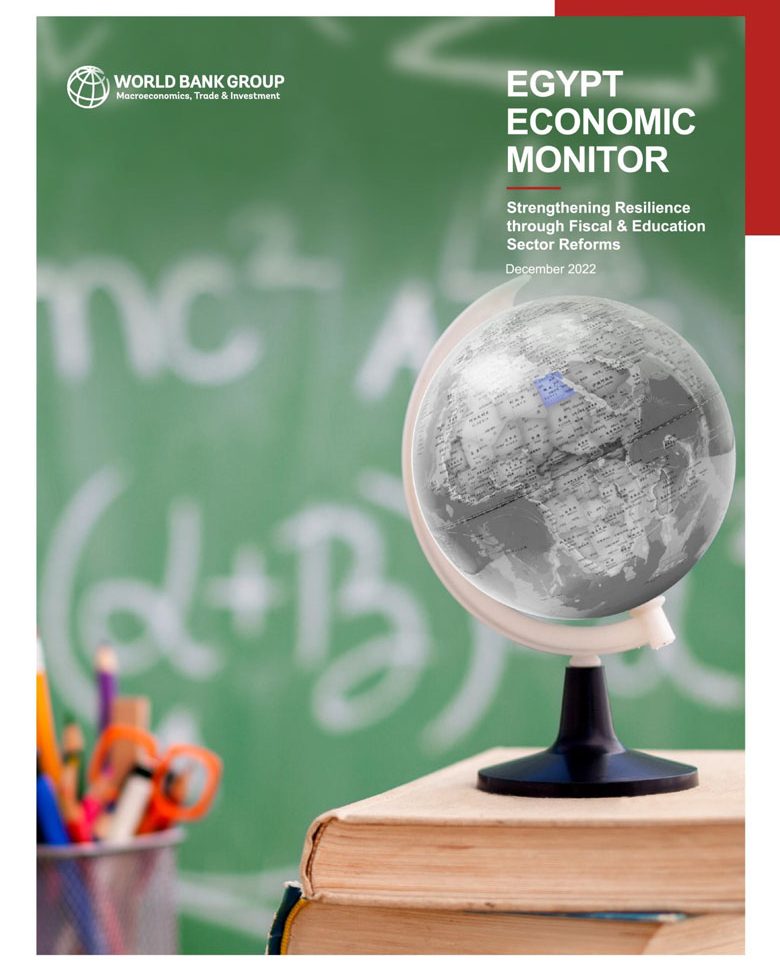
Opening concert of Annual Meeting 2025 in Davos-Klosters to address glacier melt in Antractica
The opening concert of the Annual Meeting 2025 in Davos-Klosters will address the pressing issues ...

The World Bank expected Egypt’s Sovereign issuances are expected to continue, including innovative Green Bonds and Sukuk (Islamic sovereign bonds), especially amid Egypt’s plans to up public green investments to 50 % by 2025.
This came in the World Bank report that was issued in December 2022 under the title of “Egypt Economic Monitor, Fall 2022: Strengthening Resilience through Fiscal and Education Sectors Reforms.”
The report noted that “in December 2022, the IMF Executive Board approved a 46-month arrangement under the Extended Fund Facility (EFF) for Egypt in an amount of about $3 billion. The IMF’s program identifies $1 billion financing from the Resilience and Sustainability Facility (RSF). It also projects financing of $5 billion multi-year financing package of regional and international support (this includes the World Bank’s potential financing). For sustained improvements in external accounts, trade facilitation reforms as well as broader business environment reforms are important.”
Macroeconomic and structural reforms undertaken by Egypt to start addressing entrenched economic and social problems are supporting the country in navigating the current difficult landscape.
Reforms since 2014 to ease macroeconomic imbalances, enhance the performance of the energy sector, and mobilize financing enabled the country to enter the successive crises with relatively improved fiscal accounts and ample foreign reserves. Important institutional reforms were undertaken to improve the business environment, including on the trade facilitation and the business exit/restructuring fronts.
Further, steps were taken toward increasing private sector participation and private capital mobilization in certain sectors (such as Solid Waste Management), and the government has announced plans to begin reforming the role of the State in the economy, as part of the efforts to boost private sector activity and job creation. In tandem, social protection and human development initiatives providing targeted support, such as the Takaful and Karama cash transfer programs, are now being scaled up gradually to partially shield the most vulnerable groups from the impact of rising prices.
Egypt’s renewed commitment to macroeconomic stabilization and structural reforms is crucial to address the long-standing challenges that recent global shocks have highlighted.
Egypt is facing high financing requirements at a time when global financial conditions are tightening at a significant pace. In light of the pressing global and domestic challenges, Egyptian authorities and the International Monetary Fund (IMF) reached, in October 2022, a staff-level agreement that was approved by the IMF Executive Board on December 16, 2022. The program supports comprehensive economic policies and reforms under a 46-month Extended Fund Facility (EFF) Arrangement of $3 billion.
The program also identifies a potential $1 billion financing from the IMF’s Resilience and Sustainability Facility (RSF) and also projects an additional $5 billion multi-year financing package of regional and international support.
Thus, following the strong rebound of 6.6 percent in FY2021/22, growth is expected to slow down to 4.5 percent in FY2022/23, before starting to inch up thereafter.
Among the key reforms to drive long-term growth in Egypt is the need to improve learning outcomes; thus the associated reforms of the education sector are analyzed in a ‘Special Focus’. While only one component of the overall learning process, spending on the education sector continues to be inadequate.
Despite substantial increases in nominal terms in recent years, the budgeted figures for the education sector remain at 2.0 percent of GDP for FY2022/23; lower than the level in FY2021/22.
The analysis in this Special Focus draws on a detailed analysis in the World Bank report “Egypt Public Expenditure Review for Human Development Sectors” and addresses education as an indispensable prerequisite for better-equipped human capital, higher potential output, more productive labor market entrants, and more rapid poverty reduction.
A key message is that education spending, its efficiency, and learning outcomes remain lower than needed for robust human development, poverty reduction, improved equity, and long-term growth. In September 2018, the government embarked on a major education reform program (EDU 2.0) aiming at transitioning the education system away from a traditional emphasis on rote learning, and towards acquiring higher-order critical thinking, creativity, communication, and digital skills.
The reform agenda promotes the foundations of learning starting in early grades, introduces a modernized curriculum driven by alternative television and digital learning resources, and adopts a new student assessment system.
Indeed, Egypt’s rank in the human development index improved from 116th out of 189 countries in 2019 to 97th out of 191 countries in 2021 (Human Development Reports 2020 and 2021/2022). As the ‘Special Focus’ documents, however, these efforts and achievements are yet to translate into better spending and education outcomes, especially for the poor and vulnerable.
Indeed, allocations to the health and education sectors have increased in nominal terms in FY2021/22 by 102.2 percent and 75.3 percent, respectively, compared to their levels in FY2017/18
The Egypt Economic Monitor was a product of the Macroeconomics, Trade and Investment (MTI) Global Practice (GP) in the Middle East and North Africa (MENA) unit at the World Bank Group. It consisted of two chapters; the first one provides an update on recent economic developments and an assessment of the outlook, and the second one focuses on a special topic of relevance to the country’s economic development.
The opening concert of the Annual Meeting 2025 in Davos-Klosters will address the pressing issues ...
Juhayna Food Industries proudly announced that its agricultural arm, El Enmaa for Agricultural Development, has ...
The United Nations Environment Program (UNEP) and several partners launched a pilot project to build ...


اترك تعليقا